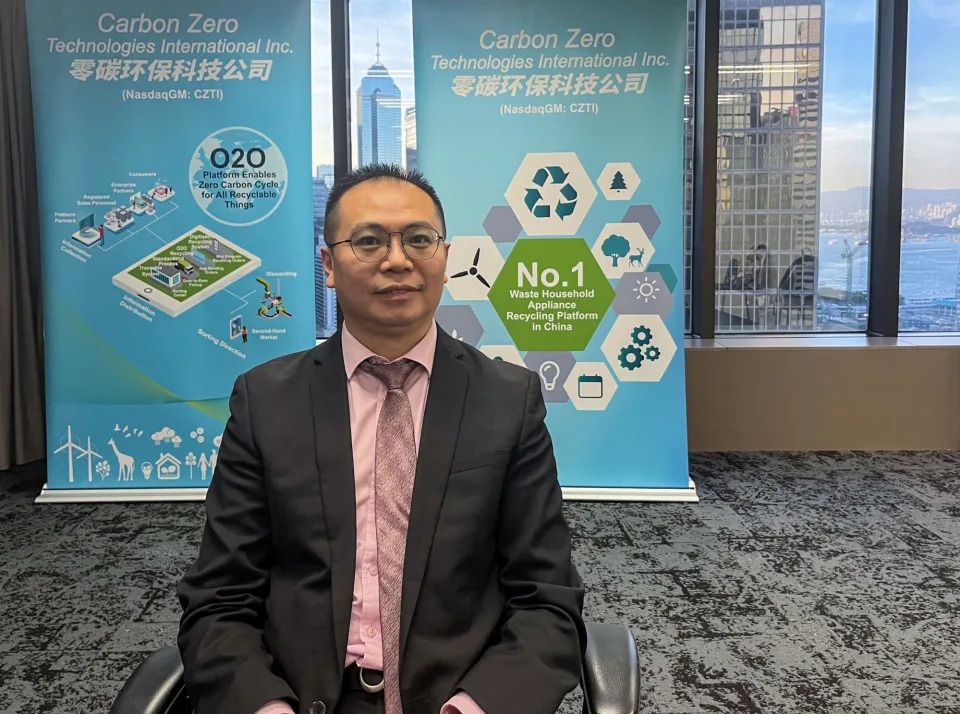News
Chinese recycling firm Carbon Zero aims to replicate success overseas after Nasdaq IPO
Shenzhen-based recycling firm Carbon Zero Technologies International, which is eyeing a US listing, is aiming to replicate its success in mainland China globally despite geopolitical uncertainties, according to its founder.
Carbon Zero, founded in 2016, operates an online platform that dispatches recycling orders from individuals, retail outlets and consumer brands to its recycling personnel. With thousands of physical sorting centres across China, the company then sells recycled items to dismantling and disposal firms.
"The recycling industry in China is relatively fragmented ... with a large number of individual practitioners," founder and CEO Baitong Tang said in an interview last week. "There is a need for a platform-based company or a formal recycling system to effectively integrate these scattered and disorderly operations. Our model happens to address this issue."
Do you have questions about the biggest topics and trends from around the world? Get the answers with SCMP Knowledge , our new platform of curated content with explainers, FAQs, analyses and infographics brought to you by our award-winning team.
Last year, Carbon Zero generated revenues of nearly 4 billion yuan (US$564.6 million), an increase of 35 per cent from a year earlier, it said in its initial public offering (IPO) prospectus.

Baitong Tang, founder and CEO of Shenzhen-based recycling firm Carbon Zero Technologies. Photo: Xinmei Shen alt=Baitong Tang, founder and CEO of Shenzhen-based recycling firm Carbon Zero Technologies. Photo: Xinmei Shen>
In May, the China Securities Regulatory Commission approved the firm to go public abroad. The following month, it filed for an IPO on the Nasdaq stock exchange, with the timing of the IPO yet to be determined.
While the net profit margin remains low at 0.4 per cent in 2022 and 0.1 per cent in 2023, Carbon Zero is already gearing up to launch its services in Singapore by February 2025, followed by Hong Kong, Europe or the US, according to Tang.
"From a long-term strategy perspective, what we need is to capture more markets," Tang said.
While many Chinese businesses going overseas in recent years have faced increased geopolitical headwinds amid escalating trade tensions between the US and China, Carbon Zero is optimistic about making it in Western markets, according to Tang.
"It would be false to say that we absolutely don't have any concerns, but I think these concerns are minor because of the nature of our industry," Tang said, adding that the company does not fall under high-end technology categories such as semiconductors or biotech.
"I think that because we'll be helping to solve their [environmental] problems, they wouldn't reject it," he said.
In 2023, the top 10 types of recycled resources in China included scrap steel, electrical and electronic products and waste batteries, according to a report published by Qianzhan Industrial Research Institute in October. The volume reached 376 million tons, up 1.5 per cent from 2022, but value declined 1.2 per cent because of a global economic slowdown, the report said.
More companies have joined the resale market amid the Chinese government's call for society to recycle and reuse materials to conserve water and energy, and reduce greenhouse gas emissions.
ATRenew, which focuses on recycling consumer electronics, went public on the New York Stock Exchange in June 2021.
Carbon Zero, which aims to raise at least US$32 million from its IPO, plans to use the proceeds to expand its product categories to lithium batteries, plastics, paper and clothing.
It will also use the funds to invest in or acquire downstream dismantling and disposal firms, Tang said. The company will aim to maintain an annual revenue growth of above 30 per cent, he added.
This article originally appeared in the South China Morning Post (SCMP) , the most authoritative voice reporting on China and Asia for more than a century. For more SCMP stories, please explore the SCMP app or visit the SCMP's Facebook and Twitter pages. Copyright © 2024 South China Morning Post Publishers Ltd. All rights reserved.
Copyright (c) 2024. South China Morning Post Publishers Ltd. All rights reserved.

